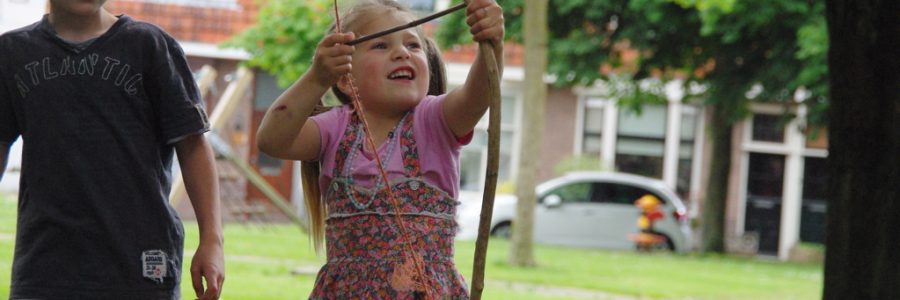At the time of writing we have arrived back in our new house a week ago from a trip to the capital. So we have started our ‘second term’ here. How did it go since the move in February? We share our ups and downs with you.
Circus Hofmann
Some of our new neighbours had never seen white people before we came, so there are children who are very afraid of us. But most found our every move most interesting. For the first three weeks there seemed to be a youth gathering right outside our house. When we went for a walk we were followed. Words uttered were repeated with many giggles. Mothers bragged to other mothers that their child was not afraid of the ‘vazaha’ (white foreigners), proving their statement by bringing their – sometimes screaming – child up close. By now most villagers are somewhat used to our appearance and we feel less like circus artists.
New Friends
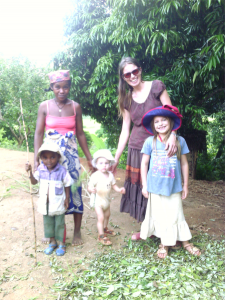 Friends and good neighbours help make a house a home, and that certainly goes for us here. We already knew Sylvestre, our first contact here who allowed AIM to build us a house on a plot of his land. We regularly share a meal. We have also become acquainted with the president of the fokontany, a high local government official, and his wife.
Friends and good neighbours help make a house a home, and that certainly goes for us here. We already knew Sylvestre, our first contact here who allowed AIM to build us a house on a plot of his land. We regularly share a meal. We have also become acquainted with the president of the fokontany, a high local government official, and his wife.
A great blessing is the friendship with maman’i Prisca, who welcomed us from the beginning. She even gave us a life chicken, a traditional but costly welcome present. We see each other most every day.
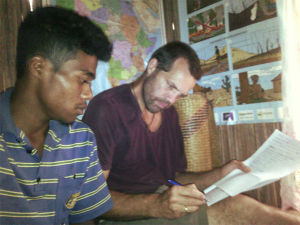 Then there is Menja, the local teacher, who has agreed to help Jurgen translate Bible stories into Tanala. They have already visited a remote village together.
Then there is Menja, the local teacher, who has agreed to help Jurgen translate Bible stories into Tanala. They have already visited a remote village together.
New Foes
Or challenges at least. We had fervently hoped for running water in the house. The pump is there, the pipes are there, and the taps – but the water… As we understand the main pipe leading from the upper village to the lower villages had breaks or leaks, and nobody knows exactly where. Then the pumps that do work leak badly so there is no pressure left to make our pump work. We are working on a solution, but things go slowly on Madagascar. So we rejoice in rain and fill up as many jerry-cans as we can to avoid having to walk to the faraway pump all too often.
Water can be a friend, but a foe as well. In March a cyclone hit our area, causing flooding and land washes. We discovered our ark-like mansion is not so waterproof… Jurgen has already spent many hours fixing leaks. So long as the rain comes straight down we stay dry, but at an angle… The road was already bad, but has got worse since the cyclone. Travelling by night is no longer an option in our area, and we had to buy mud tires for the car. They have already helped us out of a ditch twice on our last trip!
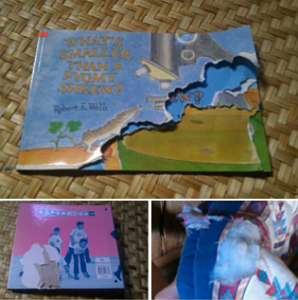 Then the rats. When we asked our friend maman’i Prisca whether she had rats in her house she said “Yes, in the roof.” Did that not bother her and keep her from sleep? “Oh well, we Malagasy sleep together with animals.” is what she replied. We honestly have a little trouble there. So far the rats have put their teeth in our food, soap, bedding, pillow covers, clothing, schoolbooks, toys, and wood. We are not amused. We gave Vanya a kitten, but she is still somewhat young to be on the job. In the meantime Jurgen is making us a ratproof cupboard for storing our fresh foods. No more rats on our tomatoes!
Then the rats. When we asked our friend maman’i Prisca whether she had rats in her house she said “Yes, in the roof.” Did that not bother her and keep her from sleep? “Oh well, we Malagasy sleep together with animals.” is what she replied. We honestly have a little trouble there. So far the rats have put their teeth in our food, soap, bedding, pillow covers, clothing, schoolbooks, toys, and wood. We are not amused. We gave Vanya a kitten, but she is still somewhat young to be on the job. In the meantime Jurgen is making us a ratproof cupboard for storing our fresh foods. No more rats on our tomatoes!
Elaborate Greetings
The Tanala take pride in their elaborate greetings. When meeting, one should inquire about how the other person has fared before, ask for news and express joy over seeing each other again. The longer the time lapse between meeting, the longer the greeting. We have not quite worked out all the greetings, but we can follow the general patterns. When walking through our village, the villagers love to test us and see if we give the correct responses.
Far Away But In the Right Place
Of course, we already knew we were far away from Holland. However, being at the end of a mud road, living off-grid, having no internet to speak of and missing the postman on his rounds (where is that man?) makes us even more aware of the distance. At times, we have felt isolated and down, but over all we recognise Gods hand in our being here. He planned it and prepared it. He wants us here. He loves the Tanala. We are learning to love them too – and so far that is not so hard.
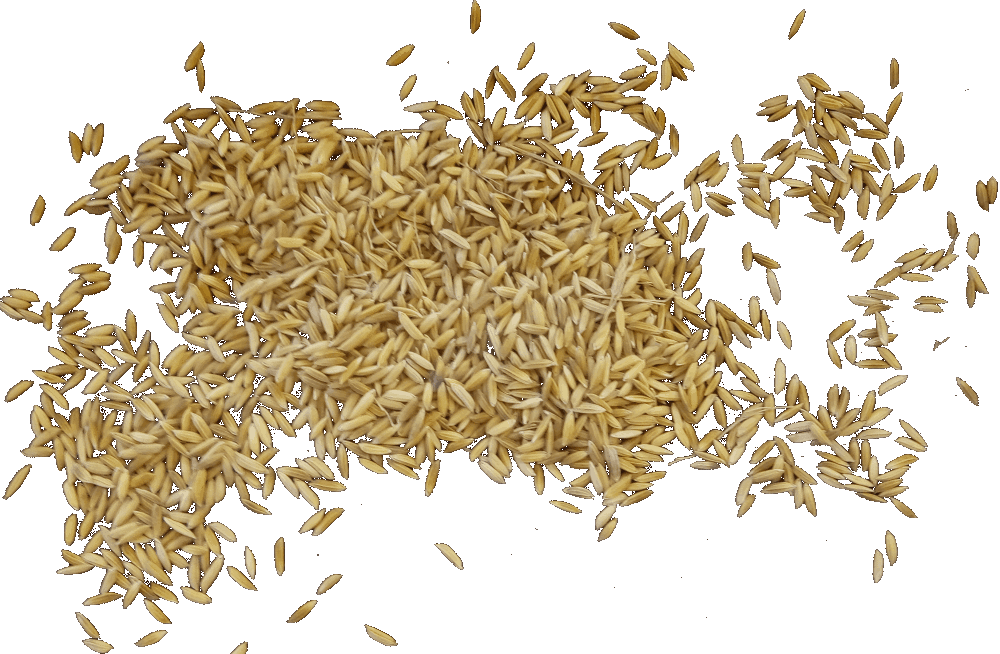


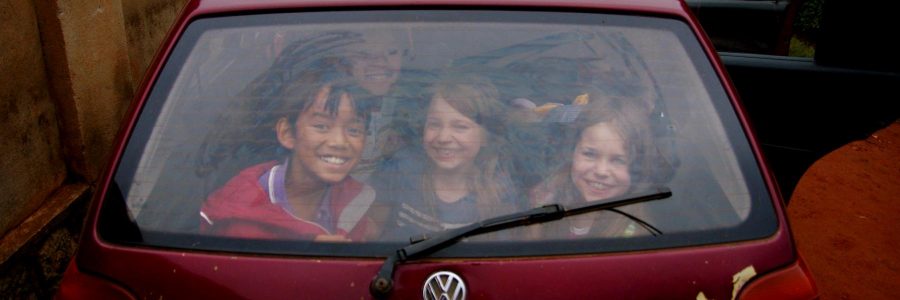
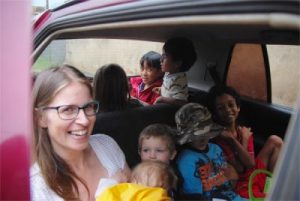 Traveling by normal car is also different. Seatbelts – if there – are hardly being used and there are no children’s car seats. The possible number of passengers is again quite flexible. Only a week ago we saw it no problem to fit 3 adults and 8 children in a car when using the back (a favourite place of our children). It is very baby-friendly: you can drink while traveling!
Traveling by normal car is also different. Seatbelts – if there – are hardly being used and there are no children’s car seats. The possible number of passengers is again quite flexible. Only a week ago we saw it no problem to fit 3 adults and 8 children in a car when using the back (a favourite place of our children). It is very baby-friendly: you can drink while traveling!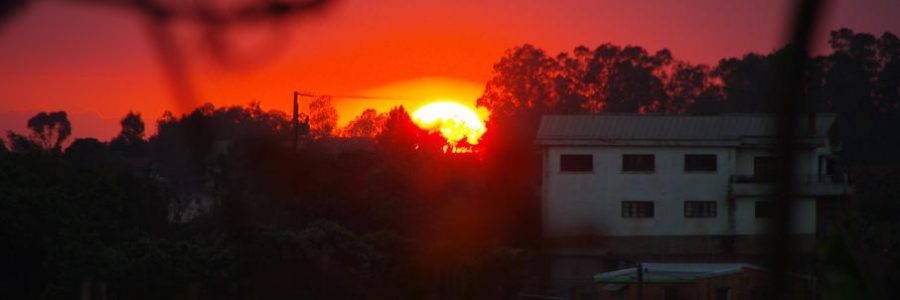
 We were not alone! A total of 22 adults and 28 children joined us and they were all ready to serve the Lord at different places. To see a bigger version of the photo on the richt you can click on it. The first week at ABO we have studied the African culture and values. Among our tutors was a Kenyan man who lived in the UK for several years. This made that he could relate to our western culture as well as to the African culture. It was good to talk with other missionaries—some of who already work in Africa for several months or even years. We have learned a lot from each other.
We were not alone! A total of 22 adults and 28 children joined us and they were all ready to serve the Lord at different places. To see a bigger version of the photo on the richt you can click on it. The first week at ABO we have studied the African culture and values. Among our tutors was a Kenyan man who lived in the UK for several years. This made that he could relate to our western culture as well as to the African culture. It was good to talk with other missionaries—some of who already work in Africa for several months or even years. We have learned a lot from each other.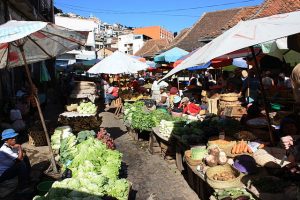 Buying food is fun. Delicious mangos for only € 0,08 and banquettes for only € 0,11. We can buy all sorts of things on the market. This week we bought 1 kilo tomatoes, 1 kilo carrots and about 400 grams of beans for 2400 Ariary (€ 0,67). Other things are more difficult to find. Full grain bread is hard to come by and can only be found in the supermarket but than you will have to be prepared to pay more.
Buying food is fun. Delicious mangos for only € 0,08 and banquettes for only € 0,11. We can buy all sorts of things on the market. This week we bought 1 kilo tomatoes, 1 kilo carrots and about 400 grams of beans for 2400 Ariary (€ 0,67). Other things are more difficult to find. Full grain bread is hard to come by and can only be found in the supermarket but than you will have to be prepared to pay more.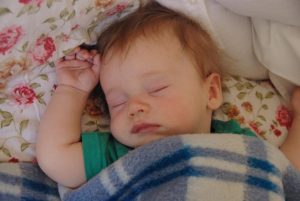 We love to see all the learned theory in action. At the same time we are very tired at the end of the day. This ‘end of the day’ is about 6 pm—the sun has gone under by then and will be up as early as 05:20. Thus our day starts at 6 am and around 9 pm we are already in our snug beds… talking about which…
We love to see all the learned theory in action. At the same time we are very tired at the end of the day. This ‘end of the day’ is about 6 pm—the sun has gone under by then and will be up as early as 05:20. Thus our day starts at 6 am and around 9 pm we are already in our snug beds… talking about which…